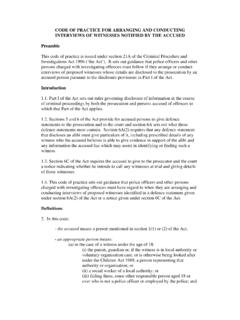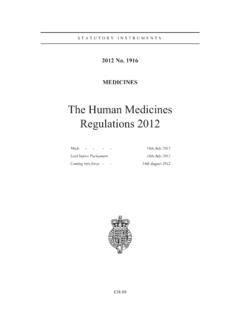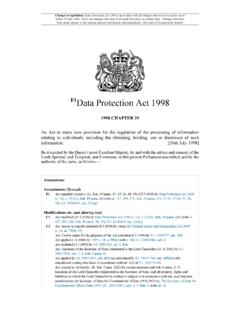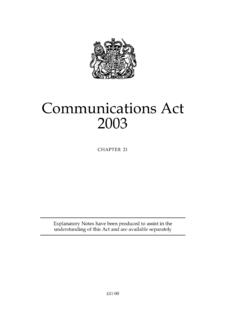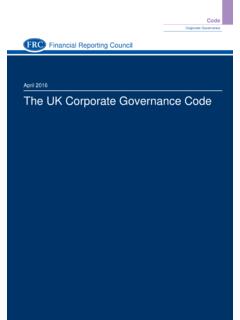Transcription of Corporate Manslaughter and Corporate Homicide Act 2007
1 Corporate Manslaughter and Corporate Homicide Act 2007 CHAPTER 19 CONTENTSC orporate Manslaughter and Corporate homicide1 The offenceRelevant duty of care2 Meaning of relevant duty of care 3 Public policy decisions, exclusively public functions and statutoryinspections4 Military activities5 Policing and law enforcement6 Emergencies7 Child-protection and probation functionsGross breach8 Factors for juryRemedial orders and publicity orders9 Power to order breach etc to be remedied10 Power to order conviction etc to be publicisedApplication to particular categories of organisation11 Application to Crown bodies12 Application to armed forces13 Application to police forces14 Application to partnershipsCorporate Manslaughter and Corporate Homicide Act 2007 (c. 19)iiMiscellaneous15 Procedure, evidence and sentencing16 Transfer of functions17 DPP s consent required for proceedings18No individual liability19 Convictions under this Act and under health and safety legislation20 Abolition of liability of corporations for Manslaughter at common lawGeneral and supplemental21 Power to extend section 1 to other organisations22 Power to amend Schedule 123 Power to extend section 2(2)24 Orders25 Interpretation26 Minor and consequential amendments27 Commencement and savings28 Extent and territorial application29 Short titleSchedule 1 List of government departments etcSchedule 2 Minor and consequential amendmentsELIZABETH IIc.
2 19 Corporate Manslaughter and Corporate Homicide Act 20072007 CHAPTER 19An Act to create a new offence that, in England and Wales or NorthernIreland, is to be called Corporate Manslaughter and, in Scotland, is to be calledcorporate Homicide ; and to make provision in connection with that offence.[26th July 2007]EITENACTED by the Queen s most Excellent Majesty, by and with the advice andconsent of the Lords Spiritual and Temporal, and Commons, in this presentParliament assembled, and by the authority of the same, as follows: Corporate Manslaughter and Corporate homicide1 The offence(1)An organisation to which this section applies is guilty of an offence if the wayin which its activities are managed or organised (a)causes a person s death, and(b)amounts to a gross breach of a relevant duty of care owed by theorganisation to the deceased.
3 (2)The organisations to which this section applies are (a)a corporation;(b)a department or other body listed in Schedule 1;(c)a police force;(d)a partnership, or a trade union or employers association, that is anemployer.(3)An organisation is guilty of an offence under this section only if the way inwhich its activities are managed or organised by its senior management is asubstantial element in the breach referred to in subsection (1).BCorporate Manslaughter and Corporate Homicide Act 2007 (c. 19)2(4)For the purposes of this Act (a) relevant duty of care has the meaning given by section 2, read withsections 3 to 7;(b)a breach of a duty of care by an organisation is a gross breach if theconduct alleged to amount to a breach of that duty falls far below whatcan reasonably be expected of the organisation in the circumstances;(c) senior management , in relation to an organisation, means the personswho play significant roles in (i)the making of decisions about how the whole or a substantialpart of its activities are to be managed or organised, or(ii)the actual managing or organising of the whole or a substantialpart of those activities.
4 (5)The offence under this section is called (a) Corporate Manslaughter , in so far as it is an offence under the law ofEngland and Wales or Northern Ireland;(b) Corporate Homicide , in so far as it is an offence under the law ofScotland.(6)An organisation that is guilty of Corporate Manslaughter or Corporate homicideis liable on conviction on indictment to a fine.(7)The offence of Corporate Homicide is indictable only in the High Court duty of care2 Meaning of relevant duty of care (1)A relevant duty of care , in relation to an organisation, means any of thefollowing duties owed by it under the law of negligence (a)a duty owed to its employees or to other persons working for theorganisation or performing services for it;(b)a duty owed as occupier of premises;(c)a duty owed in connection with (i)the supply by the organisation of goods or services (whether forconsideration or not),(ii)the carrying on by the organisation of any construction ormaintenance operations,(iii)the carrying on by the organisation of any other activity on acommercial basis, or(iv)the use or keeping by the organisation of any plant, vehicle orother thing.
5 (d)a duty owed to a person who, by reason of being a person withinsubsection (2), is someone for whose safety the organisation isresponsible.(2)A person is within this subsection if (a)he is detained at a custodial institution or in a custody area at a court orpolice station;(b)he is detained at a removal centre or short-term holding facility; Corporate Manslaughter and Corporate Homicide Act 2007 (c. 19)3(c)he is being transported in a vehicle, or being held in any premises, inpursuance of prison escort arrangements or immigration escortarrangements;(d)he is living in secure accommodation in which he has been placed;(e)he is a detained patient.(3)Subsection (1) is subject to sections 3 to 7.(4)A reference in subsection (1) to a duty owed under the law of negligenceincludes a reference to a duty that would be owed under the law of negligencebut for any statutory provision under which liability is imposed in place ofliability under that law.
6 (5)For the purposes of this Act, whether a particular organisation owes a duty ofcare to a particular individual is a question of judge must make any findings of fact necessary to decide that question.(6)For the purposes of this Act there is to be disregarded (a)any rule of the common law that has the effect of preventing a duty ofcare from being owed by one person to another by reason of the factthat they are jointly engaged in unlawful conduct;(b)any such rule that has the effect of preventing a duty of care from beingowed to a person by reason of his acceptance of a risk of harm.(7)In this section construction or maintenance operations means operations of any of thefollowing descriptions (a)construction, installation, alteration, extension, improvement,repair, maintenance, decoration, cleaning, demolition ordismantling of (i)any building or structure,(ii)anything else that forms, or is to form, part of the land,or(iii)any plant, vehicle or other thing;(b)operations that form an integral part of, or are preparatory to,or are for rendering complete, any operations within paragraph(a); custodial institution means a prison, a young offender institution, asecure training centre, a young offenders institution, a young offenderscentre, a juvenile justice centre or a remand centre; detained patient means (a)a person who is detained in any premises under (i)Part 2 or 3 of the Mental Health Act 1983 (c.)
7 20) ( the1983 Act ), or(ii)Part 2 or 3 of the Mental Health (Northern Ireland)Order 1986 ( 1986/595 ( 4)) ( the 1986 Order );(b)a person who (otherwise than by reason of being detained asmentioned in paragraph (a)) is deemed to be in legal custodyby (i)section 137 of the 1983 Act,(ii)Article 131 of the 1986 Order, orCorporate Manslaughter and Corporate Homicide Act 2007 (c. 19)4(iii)article 11 of the Mental Health (Care and Treatment)(Scotland) Act 2003 (Consequential Provisions) Order2005 ( 2005/2078);(c)a person who is detained in any premises, or is otherwise incustody, under the Mental Health (Care and Treatment)(Scotland) Act 2003 (asp 13) or Part 6 of the Criminal Procedure(Scotland) Act 1995 (c. 46) or who is detained in a hospital undersection 200 of that Act of 1995; immigration escort arrangements means arrangements made undersection 156 of the Immigration and Asylum Act 1999 (c.
8 33); the law of negligence includes (a)in relation to England and Wales, the Occupiers Liability Act1957 (c. 31), the Defective Premises Act 1972 (c. 35) and theOccupiers Liability Act 1984 (c. 3);(b)in relation to Scotland, the Occupiers Liability (Scotland) Act1960 (c. 30);(c)in relation to Northern Ireland, the Occupiers Liability Act(Northern Ireland) 1957 (c. 25), the Defective Premises(Northern Ireland) Order 1975 ( 1975/1039 ( 9)), theOccupiers Liability (Northern Ireland) Order 1987 ( 1987/1280 ( 15)) and the Defective Premises (Landlord s Liability)Act (Northern Ireland) 2001 (c. 10); prison escort arrangements means arrangements made under section 80of the Criminal Justice Act 1991 (c. 53) or under section 102 or 118 of theCriminal Justice and Public Order Act 1994 (c. 33); removal centre and short-term holding facility have the meaninggiven by section 147 of the Immigration and Asylum Act 1999; secure accommodation means accommodation, not consisting of orforming part of a custodial institution, provided for the purpose ofrestricting the liberty of persons under the age of policy decisions, exclusively public functions and statutory inspections(1)Any duty of care owed by a public authority in respect of a decision as tomatters of public policy (including in particular the allocation of publicresources or the weighing of competing public interests) is not a relevant dutyof care.
9 (2)Any duty of care owed in respect of things done in the exercise of anexclusively public function is not a relevant duty of care unless it falls withinsection 2(1)(a), (b) or (d).(3)Any duty of care owed by a public authority in respect of inspections carriedout in the exercise of a statutory function is not a relevant duty of care unlessit falls within section 2(1)(a) or (b).(4)In this section exclusively public function means a function that falls within theprerogative of the Crown or is, by its nature, exercisable only withauthority conferred (a)by the exercise of that prerogative, or(b)by or under a statutory provision; Corporate Manslaughter and Corporate Homicide Act 2007 (c. 19)5 statutory function means a function conferred by or under a activities(1)Any duty of care owed by the Ministry of Defence in respect of (a)operations within subsection (2),(b)activities carried on in preparation for, or directly in support of, suchoperations, or(c)training of a hazardous nature, or training carried out in a hazardousway, which it is considered needs to be carried out, or carried out inthat way, in order to improve or maintain the effectiveness of the armedforces with respect to such operations,is not a relevant duty of care.
10 (2)The operations within this subsection are operations, including peacekeepingoperations and operations for dealing with terrorism, civil unrest or seriouspublic disorder, in the course of which members of the armed forces comeunder attack or face the threat of attack or violent resistance.(3)Any duty of care owed by the Ministry of Defence in respect of activitiescarried on by members of the special forces is not a relevant duty of care .(4)In this section the special forces means those units of the armed forces themaintenance of whose capabilities is the responsibility of the Director ofSpecial Forces or which are for the time being subject to the operationalcommand of that and law enforcement(1)Any duty of care owed by a public authority in respect of (a)operations within subsection (2),(b)activities carried on in preparation for, or directly in support of, suchoperations, or(c)training of a hazardous nature, or training carried out in a hazardousway, which it is considered needs to be carried out, or carried out inthat way, in order to improve or maintain the effectiveness of officersor employees of the public authority with respect to such operations,is not a relevant duty of care.
